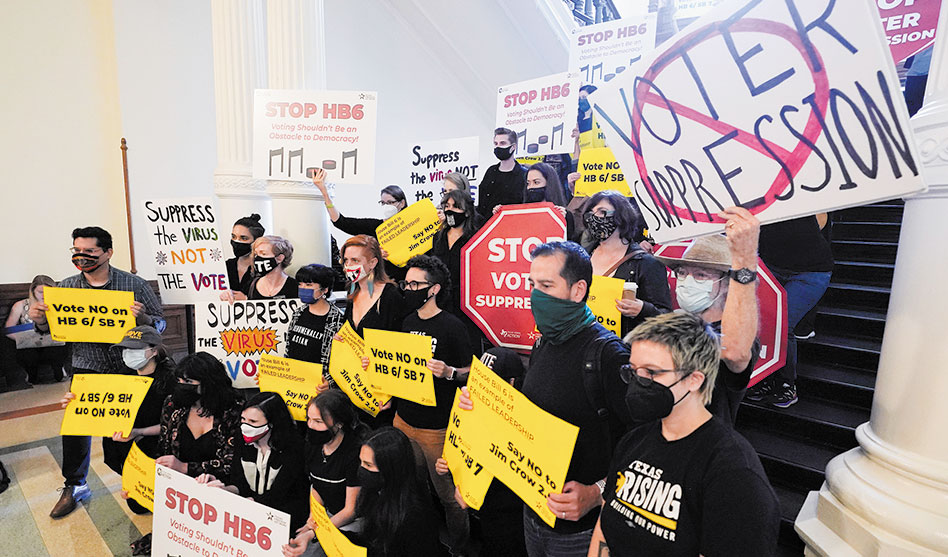
An anti-voter suppression rally at the Legislature. (Photo by Eric Gay/Associated Press)
A number of voter suppression bills died in the Texas House of Representatives. The bills included a number of provisions that would restrict access including banning drop boxes for mail-in ballots, adding rules for assisting a person with a disability, made it illegal to add a vote-by-party option and forcing voters to register separately for federal elections.
Voter rights advocate Stacey Abrams tweeted, “Your voices are making a difference. Last night, many anti-voter bills failed, proving the power of collective advocacy to protect our freedom to vote, but we must keep speaking out to defend voting rights.”
SB 7 is still on the table. This week’s Dallas Voice cover story discusses the battle going on in the Legislature over that bill. The New York Times said state Rep. Jessica Gonzalez, D-Dallas, is squarely are the forefront of the fight in Texas.
Here are the bills that died:
HB 3080, which would have created a misdemeanor offense for any person to send a mail ballot application to a person who did not first request one and would have enacted a process of thumbprint verification for mail ballots.
HB 3281, which would have required ballots returned by mail to be postmarked by the fourth day before Election Day and received by 5pm the day before Election Day. The bill would also have reduced the time to apply for a mail ballot.
HB 1725, which would have banned drop boxes entirely, by explicitly prohibiting the return of mail ballots to unattended receptacles other than a mailbox or common carrier receptacle.
HB 3970, which would have shifted the burden of proof for signature verification of mail ballots to presume that signatures do not match. This provision could have sharply increased ballot rejections.
HB 3269, which would have allowed only voters who returned their unvoted mail ballot to vote using a regular ballot at a polling location. The bill would have required voters who applied for ballots but voted in person for other reasons to vote using a provisional ballot.
HB 330, which would have limited mail voting for those living in residential facilities by requiring them to complete ballots in the presence of election workers at the facility. It also would have limited voters’ ability to choose someone to help them complete a ballot.
HB 2546, which would have created an escalating set of training, audits, and criminal penalties for clerks and registrars who the Secretary of State deemed non-compliant with voter list maintenance requirements, including adding a state jail felony for election officials.
HB 329, which would have encouraged criminal investigations of voters with questioned citizenship statuses and voters who have shown a reasonable impediment to obtaining a photo ID.
HB 2320, which would have created a state jail felony for any person other than the voter or their assistant if they pre-filled the disability reason for mail ballot voting on a ballot application.
HB 3297, which would have created several new election-related criminal offenses and raised the severity of many existing election-related criminal offenses to felonies.
HB 4459, which would have created a state jail felony for any election official who arranged a ballot in a way that would allow a voter to vote for all candidates belonging to the same party in a single gesture or motion.
HB 4507, which would have forced voters to register separately for federal and state/local elections, and would have held elections for federal offices and other offices on separate days.
— David Taffet











